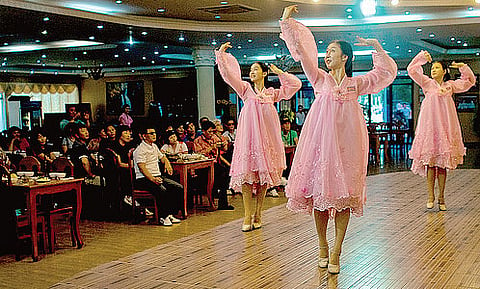

The waitress, in her early twenties, inquires about your choice of drink. “No Diet Coke. Only Coca -Cola,” she says. This banal conversation would not have seemed significant, except that it took place in a restaurant chain run by the North Korean government, manned by North Korean nationals in a posh diplomatic enclave of Bangladesh’s crowded capital.
On a quiet road in the exclusive neighbourhood of Banani, the engine-red board emblazoned with Pyongyang restaurant does make one stop—especially with high walls hiding the low-rise two-storey building from passersby.
It looks like any other restaurant —except for its name—but it’s one of a global chain of restaurants with an unusual owner, Democratic People’s Republic of Korea (DPRK).
In South Asia, besides Bangladesh, Nepal is the only other country where the secretive nation has opened restaurants—which are a highly lucrative source of foreign secrecy, also suspected to be dens for money-laundering and intelligence-gathering. North Korean observers believe that they are all run by ‘Bureau 39’ in the North Korean military, which sends out specially picked workers to these restaurants.
With a high tourist footfall from South Korea, Kathmandu could be termed as a natural location for DPRK’s flagship culinary institution. But, even there, it has not been an easy ride. In 2012, the restaurant manager ran away with all the money to India, and according reports, resurfaced in Seoul as a defector.
The choice of Dhaka is a bit more inexplicable, with South Korean presence being quite less.
A weeknight visit to the restaurant shows the parking place filled with big black American cars, but inside the restaurant is empty—except for four people. Two of them seemed like a local couple, while two men sitting next to a pillar were clearly Korean.
Unlike modern restaurants, there is no mood lighting, just bright luminescent tubes, shining down on tables, some round, some square, all of them covered by a white tablecloth. The central colour theme seemed to be beige, with faux wood elements.
The back wall was mirrored from top to bottom, making the floor seem larger than it was. In an ill-lit corner, a small Christmas tree was propped up against the handle of a closed door—its presence is likely to provide a seasonal flavour, since North Korea is officially an atheist state. It’s clear that the main attraction of the restaurant are the attractive, young waitresses—dressed in identical baby-blue gowns, sporting small North Korean pin.
With their make-do English, they plonk down a menu, as thick as a telephone directory, on the table. The cover is that of a demure Korean woman in traditional costume, while there are helpful photos of dishes, with their names in Korean and English. Appropriate to location, there were a lot of fish dishes, but the most expensive was a raw beef platter of 4,200 taka ($54.5).
A Bangladeshi visitor recounts with glee the rumour that the waitresses are all army-trained. With only a cursory knowledge of English, a conversation is a difficult task. But, our waitress, who says that her name is Hwoon, conveys that she has been in Bangladesh for two years. “I will go back in one year,” she said, with a wide smile.
When asked if she will return to waitressing in Pyongyang, she replied a bit defensively: “Have finished studies. I can do anything there... Sing, work”.
Behind her, one could see the big video screen hung on the wall, hypnotically looping pictures of Pyongyang—wide roads, tall buildings, fountains. But, this idyllic city was devoid of human presence—none of them showed a single denizen. The clock struck nine and the show began, and the waitresses turned their attention from tables to the musical performance. To taped Karaoke music, two of them first sang a Korean song, their gestures and facial expressions well-coordinated, sharing the mike with a Korean customer.
The surprise package was a Bengali song—a very popular love song written by Bangladeshi author Taslima Nasreen’s husband, Rudra Mohammad Shahidullah, who died due to drug abuse in 1992. The Korean waitress-turned-singer belted out the song, again to taped music, but the pronunciation was not expectedly kosher.
After the show finishes and bill is paid, there is still a bit more capitalist retail therapy to be done before you leave. In a cupboard at the entrance, there are flag pins worth $10 to be flaunted on lapels. But, the most expensive are boxes of ginseng—with the astounding price of 36,000 taka or $466—about half the annual per capita in North Korea.